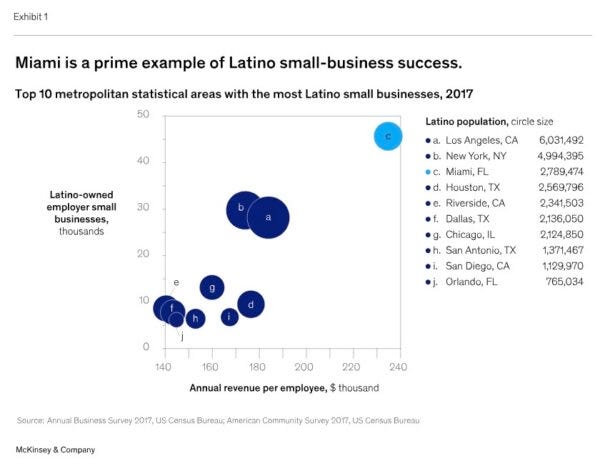The Impact of Latin Businesses, Bitcoin is No Longer El Salvador’s Legal Currency, Daddy Yankee and his $100M Divorce, and More.
News from the Hispanic World in One Click
Welcome! La Chapulina Verde is bilingual. Every article is available in English and Spanish. Enjoy reading in your preferred language. Keep up to date and follow us on our social networks! Instagram, Threads, Facebook, and YouTube.
The Impact of Latin Businesses.
What is going on?
Latino communities in the United State have huge potential to grow the economy. Today, 19% of the U.S. population identifies as Latino or Hispanic, and this number is expected to reach 28% by 2060, according to the U.S. Census Bureau. Latino business owners tend to be younger than others, which means there’s a lot of potential for long-term success as more of these young entrepreneurs get better education.
Latinos are already playing a big role in small businesses. In 2023, Latinos created 36% of all new businesses, nearly double their population size. In fact, 99% of Latino-owned businesses are small or medium-sized enterprises (SMEs). These businesses help create jobs and contribute to economic growth.
Education Helps Latino Entrepreneurs Succeed
Education can make a big difference for Latino business owners. In Miami, 30% of Latinos have a bachelor’s degree or higher, which is more than the 20% national average. This helps them start businesses in high-revenue fields like healthcare, professional services, and technology, instead of lower-revenue industries like construction and transportation.
Other cities like Austin, New York City, Orlando, and Washington, D.C. are also seeing more college-educated Latino entrepreneurs. As education levels rise, more Latino business owners will likely enter industries that bring in higher profits.
The Importance of Networking and Community
Having strong local business communities helps Latino entrepreneurs grow. In places where mentorship and networking are available, Latino-owned businesses often find more success. By sharing tips, advice, and resources, these entrepreneurs can better handle challenges and build stronger businesses.
Funding Is Essential for Business Growth
Access to funding is one of the biggest keys to success for Latino businesses. A report from Biz2Credit analyzed 121,000 small-business funding applications, including 18,000 from Latino-owned businesses. The findings were positive:
Latino credit applications rose from 12% in 2022 to 15% in 2023.
The average credit score for Latino business owners improved from 632 in 2022 to 647 in 2024.
While Latino-owned businesses still lag behind non-Latino businesses in some financial areas, the gap is getting smaller. More access to funding could help close that gap even faster.
Latino-Owned Businesses in the U.S. Economy
Small businesses are critical to the U.S. economy. They make up 99% of all businesses, contribute 44% of the GDP, and employ 46% of the workforce. Latino-owned businesses are growing quickly but are still underrepresented. While Latinos make up 19% of the adult population, own only 7% of small businesses with employees.
If these trends continue with more education, better networking, and increased funding, Latino entrepreneurs could become an even bigger force in the U.S. economy, inspiring the next generation of business owners.
Bitcoin is No Longer El Salvador’s Legal Currency
The country is facing changes.
El Salvador has made changes to its laws, reducing bitcoin's role in the economy as part of its efforts to secure funding from the International Monetary Fund, or IMF. President Nayib Bukele, once a strong supporter of bitcoin, has reversed many of his original policies to meet the IMF's conditions.
One major change is that bitcoin can no longer be used to pay taxes. The government removed the rule that allowed tax payments in bitcoin, which means it no longer qualifies as legal tender under standard definitions.
Additionally, businesses in El Salvador are no longer required to accept bitcoin as payment. Although the law originally forced merchants to accept it, this rule was never strictly enforced, and many businesses chose not to accept bitcoin even when it was considered legal tender.
Another key change is that the government is no longer required to show prices in bitcoin. While prices can still be converted to bitcoin at market rates, official figures must now be displayed in US dollars.
Bitcoin has also lost its classification as currency under Salvadoran law. The new regulations treat it more like a type of legal asset rather than a legal currency. Furthermore, the government has restricted its own acceptance of bitcoin for services like business fees or passport applications.
Despite these changes, bitcoin transactions are still exempt from capital gains taxes, and the government can hold bitcoin as a reserve asset. However, the IMF has pushed for the country to shut down or sell the state-backed Chivo wallet, which struggled with technical problems and low public adoption.
These legal adjustments are part of a deal with the IMF to unlock a 1.4 billion dollar loan. The World Bank and Inter-American Development Bank will also contribute an additional 2.1 billion dollars to help stabilize El Salvador's economy.
Daddy Yankee and his $100M Divorce.
Beginning of the Relationship.
Their love story began in Puerto Rico when they were teenagers before Daddy Yankee started his musical artist career. As a couple, they faced various crises throughout their relationship. When the artist was shot and risked losing his leg, Mireddys stood firmly by his side, witnessing how her husband's dream of becoming a baseball player slipped away forever.
Although they always kept their relationship out of the media spotlight, the artist never hid his feelings for his wife, whom he affectionately called *La Jefa* (The Boss).
The Divorce
In 2024, the artist publicly announced his divorce after three decades of being together and after trying by various means to save his marriage. Although they initially stated that they would handle the divorce privately, the situation became public due to significant financial accusations.
Daddy Yankee, whose real name is Ramón Luis Ayala, accused Mireddys González and her sister, Ayeicha Ayala, of making unauthorized transfers totaling nearly $100 million from the accounts of his companies, El Cartel Records and Los Cangris. These accusations led the singer to file a complaint and initiate legal proceedings on December 20, 2024.
After a series of private negotiations, a partial agreement was reached in which Daddy Yankee would assume the presidency of the involved companies starting December 26. Additionally, the agreement included the delivery of documents and adjustments in the management of the entities, as requested by the artist.
During the legal process, Daddy Yankee called for respect from the media and thanked the public, his legal team, and God for their support. Meanwhile, Mireddys González remained silent before the press, except for a post in her Instagram stories before the trial, where she expressed her commitment to the truth and mentioned that her relationship with Daddy Yankee had ended due to "irreconcilable differences."
Four days after the court hearing in San Juan, Mireddys shared a new message on her social media, where she leaned on her faith and mentioned that what she was going through was a test to bring her closer to God and strengthen herself. However, this message was not well received by some online users, who found the reference to faith inappropriate in the midst of such a significant financial dispute.
Additionally, a video resurfaced, recorded approximately two years earlier, in which Mireddys praised Daddy Yankee as a husband and father, highlighting his dedication to his family and his loving nature. This video contrasted with the current situation, generating mixed reactions among the artist’s followers.
Dislike Button on Instagram
Instagram is testing a new feature.
Instagram is testing a new feature that lets users privately downvote or dislike comments on both Feed posts and Reels. The goal is to help users signal when they find a comment unhelpful, irrelevant, or negative.
Instagram head Adam Mosseri confirmed that the feature is being tested, but no dislike count will be visible, and no one will know who disliked a comment. Over time, these dislikes might influence comment rankings by pushing disliked comments lower.
Meta explained that the test is part of their efforts to improve comment quality and give users more control over their experience. The feature is currently being tested with a small group of users, with potential future expansions based on the results.
Fresas Creative
This week, we’re shining a light on Fresa Creative, a creative company and candle brand that celebrates culture, color, and design—all with a deep connection to Mexican heritage. Founded by Bex Galvan, this woman-owned small business brings nostalgia to life through beautifully crafted candles inspired by her Mexican roots.
But Fresa Creative is more than just candles. It’s a reclamation of identity—taking back the word "fresa", once used as a negative stereotype of “a little rich girl” and transforming it into a symbol of empowerment. As a brand, Fresa stands for women, for the oppressed, and for those whose voices have been silenced.
Beyond her candle creations, Bex also offers creative services for small businesses, nonprofits, and new homeowners who need guidance in branding, design, and storytelling. With over six years in the nonprofit sector and a decade of experience in writing, design, and media, she brings a unique perspective to every project.
🕯️ Support Fresa Creative and shop candles that tell a story—or work with Bex to craft your own.










